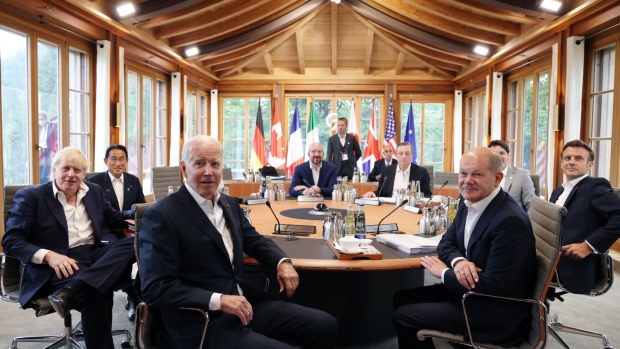Jun 28, 2022
G-7 Struggles Over Ways to Punish Russia While Taking on China
, Bloomberg News

(Bloomberg) -- Group of Seven nations agreed to stick by Ukraine to the bitter end and ratchet up the cost to Russia of its aggression, while leaving much of the detail of how to do so unresolved.
At the conclusion of a summit in Germany, leaders stressed their “unwavering commitment” to the government and people of Ukraine, and made clear their determination to make Vladimir Putin pay for his invasion.
“We will continue to impose severe and immediate economic costs on President Putin’s regime for its unjustifiable war of aggression against Ukraine,” the G-7 said, according to a draft of their final statement.
After three days of deliberations in the Bavarian Alps that were dominated by the war and its global fallout, the leaders pledged to step up efforts on global energy and food security, and to stabilize economies still recovering from the Covid-19 pandemic. But the means of doing so, including a proposed cap on Russia oil prices, remained largely aspirational.
Exploring options
While expressing concern about the burden of energy price increases and energy market instability, G-7 nations agreed only to “explore additional measures to reduce price surges and prevent further impacts on our economies and societies,” according to the draft statement.
That included a plea to “encourage producer countries to increase their production” of oil, and plans to “seek to develop solutions that meet our objectives of reducing Russian revenues from hydrocarbons.”
On the oil cap, a proposal advanced by Italy and taken up by US Treasury Secretary Janet Yellen, leaders agreed to “consider a range of approaches.” Those include “options for a possible comprehensive prohibition of all services, which enable transportation of Russian seaborne crude oil and petroleum products globally, unless the oil is purchased at or below a price to be agreed in consultation with international partners,” according to the draft.
Ministers were not instructed to flesh out the idea, however, but told “to continue to discuss these measures urgently.”
Gas vulnerabilities
On gas, G-7 leaders acknowledged their own vulnerabilities that have been exposed by the war and Europe’s rush to find alternatives to Russian supplies. Most notably that includes Germany, whose Chancellor Olaf Scholz was the summit host, and whose government has warned of the real risk of shortages in Europe’s biggest economy and a Lehman-like domino effect.
So they stressed the role of increased deliveries of liquefied natural gas, adding they “acknowledge that investment in this sector is necessary in response to the current crisis.”
That’s a reversal of an agreement affirmed as recently as May to stop funding fossil fuel projects overseas. At the same time, leaders committed to stick with the goal of limiting global warming to 1.5 degrees Celsius.
“In these exceptional circumstances, publicly supported investment in the gas sector can be appropriate as a temporary response, subject to clearly defined national circumstances, and if implemented in a manner consistent with our climate objectives,” the leaders said, according to their draft statement.
China challenge
While Russia’s war on Ukraine dominated, the G-7 had an eye on its next major challenge with a section on an increasingly assertive China.
There is “no legal basis for China’s expansive maritime claims in the South China Sea,” the leaders said, reminding Beijing of the need to uphold its obligations under international law and to “abstain from threats, coercion, intimidation measures or use of force,” according to the draft.
They called on China to respect its commitments to democracy in Hong Kong, referred to Beijing’s “non-transparent and market-distorting interventions” in the economy, and expressed grave concern over human rights in Tibet and Xinjiang.
In a section that summed up the summit’s sense of grasping for solutions, the G-7 issued a call to China to press Russia to “stop its military aggression.” But as leaders well know, that’s something Beijing has been reluctant to do.
©2022 Bloomberg L.P.


